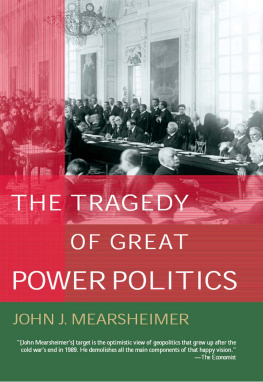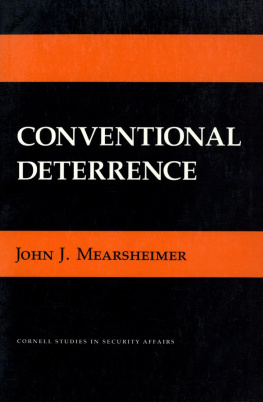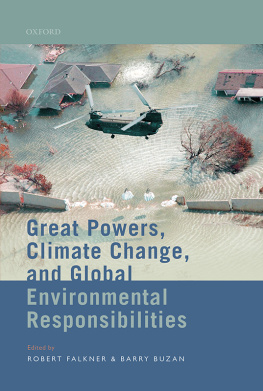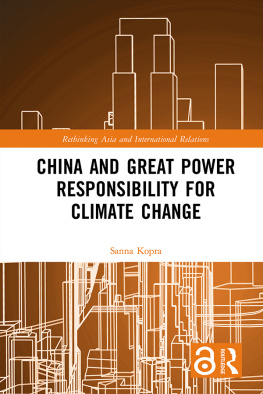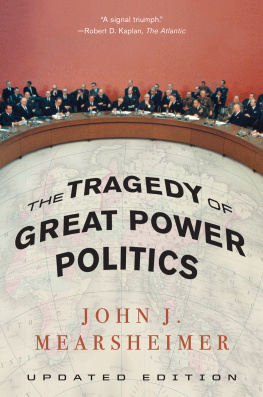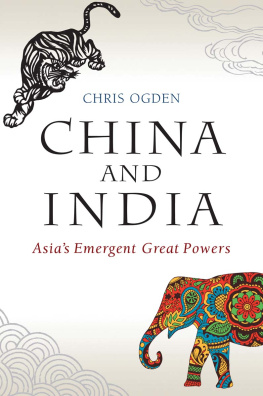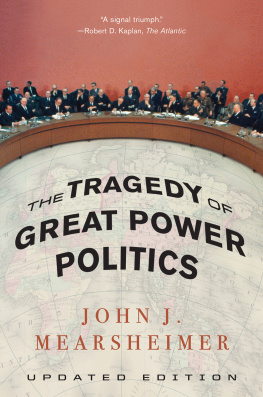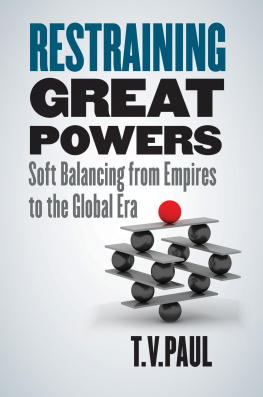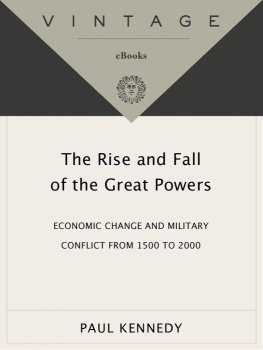The Tragedy of Great Power Politics
John J. Mearsheimer
University of Chicago
W. W. NORTON & COMPANY NEW YORK LONDON
Copyright 2001 by John J. Mearsheimer
All rights reserved
For information about permission to reproduce selections
from this book, write to Permissions, W. W. Norton & Company, Inc.,
500 Fifth Avenue, New York, NY 10110.
Production manager: Leelo Mrjamaa-Reintal
Library of Congress Cataloging-in-Publication Data
Mearsheimer, John J.
The tragedy of Great Power politics / John J. Mearsheimer.
p. cm.
Includes bibliographical references.
ISBN: 978-0-393-07624-0
1. World politics19th century. 2. World politics20th century.
3. Great powers. 4. International relations. I. Title.
D397.M38 2001
327.1'01dc21
2001030915
W. W. Norton & Company, Inc., 500 Fifth Avenue, New York, N.Y. 10110
www.wwnorton.com
W. W. Norton & Company Ltd., Castle House, 75/76 Wells Street, London W1T 3QT
LIST OF MAPS
Targets of Japanese Expansion in Asia, 18681945 |
Europe in 1914 |
Soviet Expansion in Eastern Europe during the Early Cold War |
Targets of Italian Expansion in Europe and Africa, 18611943 |
North America in 1800 |
Westward Expansion of the United States, 18001853 |
Europe at the Height of Napoleons Power, 1810 |
Central Europe in 1866 |
Europe in 1935 |
LIST OF TABLES
The Major Realist Theories |
Indicators of British and Russian Wealth and Population, 18301913 |
Indicators of French and Prussian/German Wealth and Population, 18301913 |
Relative Share of European Wealth, 18161940 |
Relative Share of European Wealth, 194144 |
Relative Share of Superpower Wealth, 194590 |
Manpower in European Armies, 187595 |
Relative Share of World Wealth, 18301940 |
Population in the Western Hemisphere, 18001900 |
The United Kingdom and the United States, 18001900 |
Populations of European Great Powers, 17501816 |
Manpower in European Armies, 17891815 |
Manpower in European Armies, 186270 (Wars of German Unification) |
Manpower in European Armies, 19001918 (World War I) |
Manpower in European Armies, 192030 |
Manpower in European Armies, 193338 |
Size of French and German Armies after Mobilization, 193840 |
Manpower in European Armies, 193941 |
Manpower in European Armies, 182058 |
Manpower in European Armies, 185356 (Crimean War) |
Summary of European Wars by System Structure, 17921990 |
The Asian Balance of Power, 2000 |
The European Balance of Power, 2000 |
Chinas Economy in Perspective |
PREFACE
T he twentieth century was a period of great international violence. In World War I (191418), roughly nine million people died on European battlefields. About fifty million people were killed during World War II (193945), well over half of them civilians. Soon after the end of World War II, the Cold War engulfed the globe. During this confrontation, the Soviet Union and its Warsaw Pact allies never directly fought the United States and its North Atlantic Treaty Organization allies, but many millions died in proxy wars in Korea, Vietnam, Afghanistan, Nicaragua, Angola, El Salvador, and elsewhere. Millions also died in the centurys lesser, yet still fierce, wars, including the Russo-Japanese conflicts of 19045 and 1939, the Allied intervention in the Russian Civil War from 1918 to 1920, the Russo-Polish War of 192021, the various Arab-Israeli wars, and the Iran-Iraq War of 198088.
This cycle of violence will continue far into the new millennium. Hopes for peace will probably not be realized, because the great powers that shape the international system fear each other and compete for power as a result. Indeed, their ultimate aim is to gain a position of dominant power over others, because having dominant power is the best means to ensure ones own survival. Strength ensures safety, and the greatest strength is the greatest insurance of safety. States facing this incentive are fated to clash as each competes for advantage over the others. This is a tragic situation, but there is no escaping it unless the states that make up the system agree to form a world government. Such a vast transformation is hardly a realistic prospect, however, so conflict and war are bound to continue as large and enduring features of world politics.
One could challenge this gloomy view by noting that the twentieth century ended peacefullywith the end of the Cold Warand that relations among the great powers are quite peaceful as we begin the twenty-first century. This is certainly true, but predicting the future by simply extrapolating forward from the present does not make for sound analysis.
Consider what that approach would have told a European observer at the start of each of the previous two centuries. In 1800, Europe was in the midst of the French Revolutionary and Napoleonic Wars, which lasted twenty-three years (17921815) and involved all of that eras great powers. Extrapolating forward from that bloody year, one would have expected the nineteenth century to be filled with great-power conflict. In fact, it is among the least conflictual periods in European history. In 1900, on the other hand, there was no warfare in Europe that involved a great power, and little evidence portended that one was in the offing. Extrapolating forward from that tranquil year, one would have expected little conflict in Europe during the twentieth century. As we know, the opposite was the case.
General theories of international politics offer useful tools for anticipating what lies ahead. The most useful theories of this sort would describe how great powers normally behave toward each other and would explain their conduct. Useful theories would also account in good part for how the great powers have behaved in the past, including explaining why some historical periods were more conflictual than others. A theory that satisfies these requirements and helps us look backward to understand the past should also help us look forward and anticipate the future.
In this book I try to offer a theory with these attributes. My theory, which I label offensive realism, is essentially realist in nature; it falls thus in the tradition of realist thinkers such as E. H. Carr, Hans Morgenthau, and Kenneth Waltz. Its elements are few and can be distilled in a handful of simple propositions. For example, I emphasize that great powers seek to maximize their share of world power. I also argue that multipolar systems which contain an especially powerful statein other words, a potential hegemonare especially prone to war.
These and other propositions in this book will be controversial. In their defense I try to show that the logic that underpins them is sound and compelling. I also test these propositions against the historical record. For evidence I look mainly at relations between the great powers since 1792. Finally, I use the theory to forecast the likely future shape of great-power relations.

